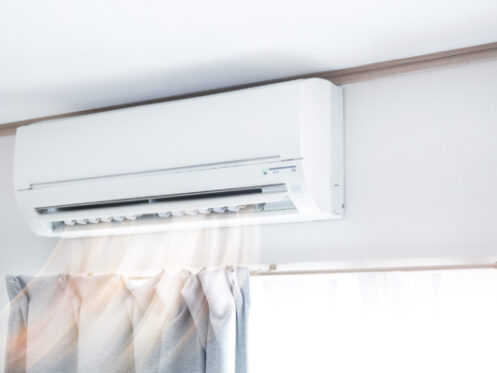When you want to add a heating and air conditioning system to your home, a ductless unit may be the best solution depending on your situation. Ductless heating and air conditioning systems, also known as mini-splits, are designed with efficiency in mind and can be placed in individual rooms throughout your home. Before you decide to purchase your next heating or air conditioning system, it may be beneficial to consider the positives versus the negatives of a ductless system.
Difference Between Ductless and Traditional Systems
While ductless systems are similar to other central HVAC units, there are a few differences in how they function. The main difference between this HVAC unit and all other options is that there are not any ducts that the air flows through. In addition, a mini-split system has one or more wall units in your home that connect to an exterior heat pump that is usually placed in your backyard or at the side of your house. Ductless heating and cooling systems deliver precise temperature control when and where you need it, and they are energy efficient.
Pros of Ductless HVAC Units
The installation of ductless units is relatively simple. The indoor air handler can be hung on an exterior wall of the room you want to heat or cool. When a professional installs the unit, they will drill a small hole behind the air handler for a hose connecting to the outdoor compressor and condensing unit.
Another advantage of mini-split systems is that most of the noise they produce is from the outdoor unit. This means the interior of your home stays quieter than it would if you opted for a traditional window air conditioner to cool a room. They are also fundamentally more efficient than ducted systems because homeowners can lose as much as 25 percent of their heating or cooling when it is circulating through ductwork that may have leaks.
Another benefit of a mini-split system is variable speed technology. With traditional systems, the heating or cooling unit blasts cold or hot air until the temperature in a room meets the set point on the thermostat, then shuts down. The system is either on or off. Alternatively, the variable speed compressor in a ductless system’s outdoor unit can run between 30 percent and 100 percent of its capacity. This means when only a little heating or cooling is needed to keep a room comfortable on mild days, the system does not crank up to 100 capacity and waste energy as a traditional system would. Instead, it adjusts capacity based on the demand placed on the system.
Cons of Ductless HVAC Units
There are three notable issues with ductless heating and air conditioning systems, which include the initial costs, the maintenance requirements, and the appearance. If you only expect to use ductless units in a single room, these systems can be considerably more expensive than window units. You may recover some of these initial costs from lower energy bills.
The second issue with a ductless unit is that the maintenance requirements can be extensive because of how often the air filter requires cleaning. Ductless air filters are usually much smaller than the ones placed in central HVAC units, which means that dust and dirt particles build up more quickly. The filters in central HVAC systems are designed to be replaced about every three months but don’t require cleaning. Even though ductless filters only need to be replaced once a year, most manufacturers recommend washing the filters every two to four weeks.
Many homeowners are also cautious about installing a ductless system because they feel these units don’t have the best aesthetics. They’re usually available in beige or white and can’t be covered up.
Questions to Ask Yourself When Considering a Ductless Unit
Before you decide to purchase a ductless unit, there are several questions you may want to ask yourself to determine if it’s the right choice for you.
Q: Are Ductless Systems More Efficient Than Window AC Units?
Ductless systems and window units can both cool individual rooms in a home. Despite the similar functionality, ductless systems are more efficient and cost-effective after installation. In addition, it is difficult to insulate well around an AC unit placed in a window which may result in energy being wasted because of air leaks.
Q: Is My Home Duct-friendly?
Another question you should ask yourself is if your home is duct-friendly. Certain spaces are not built in a manner that allows ductwork to be added without spending a prohibitive amount of money. Additionally, installing ducts is impossible in some older single-family homes and mobile homes. For these structures, ductless HVAC systems are advantageous.
Ideal Applications for Ductless Heating and Air Conditioning
A ductless heating and air conditioning unit isn’t the perfect fit for every homeowner. However, ductless systems are beneficial for numerous applications, which can even include whole-home heating and cooling. This is accomplished by placing serval air handlers in different rooms that all connect to the outdoor unit.
Downsizing
Some people, like older adults, choose to downsize to an entirely different living situation, the most common of which is to move from a home to a smaller apartment. However, some people downsize their living situation without moving. If you don’t want to cool and heat rooms that you aren’t currently using, a ductless heating and air conditioning system allows you to maintain the temperature in specific rooms.
Heating and Cooling an Addition
If you’re adding a new bedroom or living area to your home, a ductless unit can be used to heat and cool the new space. This is a good solution when adding ductwork would be cost-prohibitive or impractical. In addition, some people are concerned about overwhelming their current heating and cooling system with a new space.
Accommodating Multiple Needs in One Home
Ductless units are capable of accommodating multiple needs in a single home. Every room or area in your home is its own zone with this type of system. If one family member is working out in the living room and wants the temperature to be relatively cool, they can alter the temperature in the living room without annoying other members of the family.
Adding HVAC to a Single Room
If there’s a room in your home that has specific heating and cooling issues, a ductless system may deliver the results you’re looking for. A finished basement, for example, may not be used much because it is usually not comfortable to be in.
Contact the Professionals
At Huft Home Services, we’re committed to offering high-quality heating and air conditioning services to Elk Grove, CA residents, and the surrounding areas. We install, maintain, and repair heating and cooling systems. In addition, we are also electrical and plumbing experts, providing services like drain cleaning, leak detection, and electric panel upgrades.
If you are considering a ductless heating and cooling system for your home, don’t hesitate to contact us today so we can get started.




